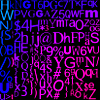🎉 Celebrating 25 Years of GameDev.net! 🎉
Not many can claim 25 years on the Internet! Join us in celebrating this milestone. Learn more about our history, and thank you for being a part of our community!
Poker/Texas Hold'em
Hello people,
I'm doing a Texas Hold'em implementation of Poker. I've been studying the game and it's great.
Texas Hold'em is just like regular poker, except that only 2 cards are dealt to each player, and then 5 "community" cards that are available to all players to use to make the best 5 card hand, that is they can use any of their 2 cards and any of the 5 cards on the table to create the best 5 card poker hand.
My main problems I need to solve are the following:
1. Since the player has 7 cards, I need to figure out what combination of 5 cards out of 7 cards makes up the best possible hand.
2. Compare all best possible hands of each player, to figure out the winner.
3. Tell the player what kind of a hand he has, some don't know the rules and I want to print somewhere on the screen "You have a pair of aces", or "You have a flush, king high.". So I need to create a textual description of the hand.
Since Texas Hold'em is a iterative game, that is; you start with 2 cards, then 3 cards are dealt to the table, then 1 more card, and then the final 1 card. So you have to create a textual description of the hand 4 times (when you have 2 cards, 5 cards, 6 cards and then 7 cards.)
I hope this makes any sense. Anything will help me:
- Articles
- Tutorials
- Code
- Papers
The task you're asking about could be separated to two subparts.
The first is the routine that evaluates a list of cards { 7c, 8c, 9c, Tc, Jc} and gives the best (or all) hand it matches to, for example { Straight Flush, Jack High }
An useful idea with ranking hands in many card games, not just in Poker, is to map all the possible hands to a number in the way that higher the number, the better the hand. So the second subtask is to map the rank of the hand { Straight Flush, Jack High } to its numerical value. The idea here is that you can after that use the normal <, ==, > comparisons to find the relative orderings of two hands. The mapping should be constructed so that it discards all the irrelevant information (e.g. 6th kicker) of the card list and retains only the necessary information which is packed suitably to the bits of an integer.
For example, for a straight flush you only need to store the highest rank of the card that makes that straight flush. For three of a kind, the rank of the threes matter most, then the higher kicker and finally the second kicker.
Try googling for "poker hand evaluator", I think you'll find a plenty of examples.
The first is the routine that evaluates a list of cards { 7c, 8c, 9c, Tc, Jc} and gives the best (or all) hand it matches to, for example { Straight Flush, Jack High }
An useful idea with ranking hands in many card games, not just in Poker, is to map all the possible hands to a number in the way that higher the number, the better the hand. So the second subtask is to map the rank of the hand { Straight Flush, Jack High } to its numerical value. The idea here is that you can after that use the normal <, ==, > comparisons to find the relative orderings of two hands. The mapping should be constructed so that it discards all the irrelevant information (e.g. 6th kicker) of the card list and retains only the necessary information which is packed suitably to the bits of an integer.
For example, for a straight flush you only need to store the highest rank of the card that makes that straight flush. For three of a kind, the rank of the threes matter most, then the higher kicker and finally the second kicker.
Try googling for "poker hand evaluator", I think you'll find a plenty of examples.
Thank you clb, I'm sure that will help.
Of course more pointers are welcome :)
This is for my final project for BSc. degree. I already have 6-7 years programming experience, and I've used Java primarily, but also C#, Perl, and PHP a lot. I've also taken courses on many other languages, smalltalk, scheme, prolog, sml etc. And I've been programming games for 2 years now.
Of course more pointers are welcome :)
This is for my final project for BSc. degree. I already have 6-7 years programming experience, and I've used Java primarily, but also C#, Perl, and PHP a lot. I've also taken courses on many other languages, smalltalk, scheme, prolog, sml etc. And I've been programming games for 2 years now.
There is a very good open source poker hand evaluation library called pokersource. It is very fast and very flexible.
I learned a lot about evaluating poker hands by looking at how it is implemented. In fact, it is so much better than what I was doing that I just dumped my code and used it instead. I have to warn you that the code is ugly because it is optimized (and because it is C, and because it is open source).
I learned a lot about evaluating poker hands by looking at how it is implemented. In fact, it is so much better than what I was doing that I just dumped my code and used it instead. I have to warn you that the code is ugly because it is optimized (and because it is C, and because it is open source).
That C code is non-reusable, non-readable, and non-documented. Too bad if it's the "best" out there, means I'm in a bad spot!
Besides, I'm doing my application in Java, trying to understand what one of those C files are doing is impossible within my timeframe :)
Besides, I'm doing my application in Java, trying to understand what one of those C files are doing is impossible within my timeframe :)
I haven't done this, but my intuition says the following:
- Start testing from highest possible combination (straight flush) to lowest (one pair, and ultimately high card), because you only need the best possible hand.
- Make an algorithm that can sort the seven cards by rank and/or suit.
- Simply iterate through the cards to find the combinations. I could imagine the following pseudo-code for finding a straight (testing for other combinations would not differ that much):
- Start testing from highest possible combination (straight flush) to lowest (one pair, and ultimately high card), because you only need the best possible hand.
- Make an algorithm that can sort the seven cards by rank and/or suit.
- Simply iterate through the cards to find the combinations. I could imagine the following pseudo-code for finding a straight (testing for other combinations would not differ that much):
int cards[7] = {2, 11, 8, 6, 8, 10, 5} // numbers representing rankint count = 1 // number of consecutive cardssort_cards_by_rank(&cards, ASC)for (int i = 1; i < 7; i++){ if ((cards - cards) != 1)<br> {<br> if (i > 3)<br> break; // no straight possible (need at least five cards)<br> else<br> count = 1; // reset counter, but keep looping<br> }<br> else<br> {<br> count++;<br> }<br>}<br><br>if (count >= 5)<br> print("straight")<br>else<br> print("no straight")</pre>You'll probably want to keep track of last card of the straight to compare it against someone else's straight, and it is would be wise to give a value to the result for easy comparison: say 1000 + total of ranks in the straight. In that case a flush could be represented using: 2000 + total of ranks, thus always resulting in a larger number than a straight. And so on..
Yes, I thought of the same.
There are basically 10 types of hands I can have:
1. Royal Flush
2. Straight Flush
3. Four of a kind
4. Full House
5. Flush
6. Straight
7. Three of a Kind
8. Two Pairs
9. Pair
10. High Card
I could start by checking for a Royal Flush, then work my way downwards. This is probably the EASY part.
Tricky part:
Figuring out what 5-card-hand out of those 7 cards are the best.
(nCr) 7C5 = 21 possible combinations (if I learned anything at all in statistics math class)
I would probably want to loop through each of those possible combinations and assign some score/value to it, in order to get the highest ranked hand the player can form.
I would like to assign some meaningful score to each hand, not just I "invented" out of thin air. I'm thinking this has been done million times before.
There are basically 10 types of hands I can have:
1. Royal Flush
2. Straight Flush
3. Four of a kind
4. Full House
5. Flush
6. Straight
7. Three of a Kind
8. Two Pairs
9. Pair
10. High Card
I could start by checking for a Royal Flush, then work my way downwards. This is probably the EASY part.
Tricky part:
Figuring out what 5-card-hand out of those 7 cards are the best.
(nCr) 7C5 = 21 possible combinations (if I learned anything at all in statistics math class)
I would probably want to loop through each of those possible combinations and assign some score/value to it, in order to get the highest ranked hand the player can form.
I would like to assign some meaningful score to each hand, not just I "invented" out of thin air. I'm thinking this has been done million times before.
I would just rank the 10 types of hands and run through them, checking to see if any combination of the cards qualify for the particular hand. Once that is done, you have your best hand available. I don't really get what you mean by having a meaningful score for each hand. Could you elaborate?
This topic is closed to new replies.
Advertisement
Popular Topics
Advertisement







